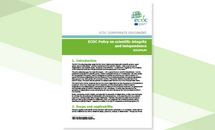ECDC policy on scientific integrity and independence
This policy elaborates upon how scientific integrity – with a special focus on scientific independence – is to be maintained during all ECDC scientific activity, whether conducted internally or in collaboration with other parties.
Executive summary
For the purposes of this policy, scientific independence is defined as conducting any scientific activity in a manner that ensures independence from the influence of the commissioning parties, commercial organisations, lobby groups or any other parties with an interest. Further, if the activity results in the production of any scientific output, this should also be published and disseminated free from any of the influences listed above.
This internal policy further recognises that not only actual independence but also the perception of independence is important, since it can impact upon ECDC’s reputation, and thus the perception of ECDCs scientific independence is as indispensable to maintaining the confidence of the Community institutions, the general public and interested parties as scientific independence in fact. Accordingly, this policy also discusses how the perception of independence is to be maintained at all times while carrying out the functions related to ECDC’s core mandate.
Finally, maintaining scientific integrity, and especially the perception of independence, is often more challenging for activities that are performed in collaboration with external partners. At the same time, ECDC as a network organization, achieves added value through collaboration. Therefore, this policy also seeks to ensure that by laying out clear guiding principles for collaborating, ECDC can collaborate with all external partners without impacting its scientific integrity – especially as relates to its scientific independence and the perception of it.
Download




